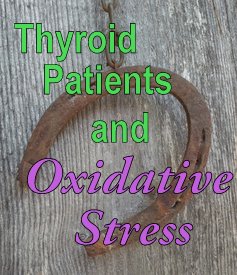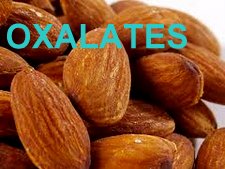What thyroid patients should know about Oxidative Stress
 With a recent Italian study hypothesizing a significant correlation between T4-only levothyroxine use and lung cancer because of “oxidative stress” (possibly due to the serum peak of T4), or the same oxidative stress simply from the hypothyroidism itself, it spurs curiosity as to what oxidative stress is about and what we, as thyroid patients, can learn from this biological phenomena!
With a recent Italian study hypothesizing a significant correlation between T4-only levothyroxine use and lung cancer because of “oxidative stress” (possibly due to the serum peak of T4), or the same oxidative stress simply from the hypothyroidism itself, it spurs curiosity as to what oxidative stress is about and what we, as thyroid patients, can learn from this biological phenomena!
Oxidation–what the heck is that?
I have a shampoo holder that hangs from the shower nozzle, and to my dismay, it started to rust underneath the coating. (Note to self: don’t buy a hanging shampoo holder from a garage sale, even if it does look brand new).  And this rust is an example of “oxidation”, i.e. when the iron comes into contact with oxygen (also via moisture), an oxidized corrosion will form called “rust”. Other examples of oxidation are the greenish patina you see on copper, the fading of paint on your house, or the brown coating you’ll see on an exposed cut apple…all due to the substance coming in contact with oxygen.
In your body, oxidation is a constant and normal chemical reaction going on every hour, every day and occurring when your cells come into contact with oxygen. It’s a required process to supply your body and all its cells with energy. Oxidation helps your body to get rid of old cells in favor of new cells. Your immune system also uses oxidation to attack and kill off pathogens.
Biologically, oxygenation describes the process of any particular molecule (which is made up of connected atoms) coming into contact with oxygen (making it an “oxygenated molecule”), resulting in the loss of an electron–a subatomic particle with a negative electric charge that surrounds any of those atoms. This oxygenated-molecule-minus-an-electron will frantically try to connect with another molecule which does NOT have this electron loss, and this constant attempt of connection produces an unstable “free radical”. And free radicals can cause all sorts of havoc.
Fortunately, a healthy and balanced body has a built-in ability to keep these unstable free radicals in check with anti-oxidant defense mechanisms…or at the very least, slow the havoc of a free radical down. Those heroes include several anti-oxidant enzymes, also called free radical scavengers, which can neutralize all those frenzied free radicals. Our body will also use nutrients in what we eat to squelch those free radicals, such as Vitamin C and E. Our bodies have the ability to repair DNA and tissue damage from free radicals, as well as zap damaged cells to death!
When Oxidation become “Oxidative Stress”
On the negative side, sometimes your body can lose the ability to take care of all the free radicals caused by the constant oxidation. (Collectively, all these free radicals are called “reactive oxygen species” (ROS).) The body then becomes overwhelmed by the excess of oxygenated free radicals, causing all sorts of damage. And this is all termed “oxidative stress”.Â
Alarmingly, oxidative stress can cause the loss of one of your key and internally-natural antioxidants: glutathione. Glutathione is a powerful antioxidant produced by your own cells, and it neutralizes those free radicals/reactive oxygen species. It also works expertly with antioxidants vitamin C and E. And as your glutathione levels fall, a cascade of toxic deterioration and damage can also begin, from cells to tissues to organs. Scientists theorize, and studies propose, that this is what leads to conditions like:
- chronic inflammation
- cognitive dysfunction
- Alzheimers
- premature aging
- Parkinson’s
- Sickle Cell Anemia
- autism
- heart disease
- atherosclerosis
- renal disease
- lung disease
- cancer
Oxidative stress may also be negatively affecting your methylation process, such as the MTHFR enzyme.
Dr Andrew Weil explains :
Although we need oxygen to live, high concentrations of it are actually corrosive and toxic. We obtain energy by burning fuel with oxygen – that is, by combining digested food with oxygen from the air we breathe. This is a controlled metabolic process that, unfortunately, also generates dangerous byproducts. These include free radicals – electronically unstable atoms or molecules capable of stripping electrons from any other molecules they meet in an effort to achieve stability. In their wake they create even more unstable molecules that then attack their neighbors in domino-like chain reactions.
Some Causes of oxidative stress
There are quite a few situations mentioned in articles and studies which can cause your body to be overly stressed from the results of oxidation and all the reactive oxygen species. They include, but are not limited to:
- excess endurance exercising
- excess weight lifting
- lack of key antioxidant nutrients like Vitamin C, Vitamin E, Selenium, Magnesium and other minerals
- excess radiation or sunlight
- smoking (huge cause of oxidative stress)
- excessive drinking or drug use
- over-exposure to toxins in our air, water and foods like pesticides, chemicals, heavy metals and more
- prescription medications
- processed foods with all their artificial dyes, additives or flavorings
- excess physical trauma
- Graves disease aka hyperthyroidism
- excess copper levels from the MTHFR defect
Your thyroid condition and Oxidative Stress
In addition to all the above, there are a vast amount of documentation about the strong relationship between hypothyroidism and Oxidative Stress. In just four examples of many:
- Oxidative stress and enzymatic antioxidant status in patients with hypothyroidism before and after treatment : Â concludes that “increased ROS levels in hypothyroidism may result in a pro-oxidation environment, which in turn could result in decreased antioxidant PON1 activity, increased MDA (malondialdehyde) and NO (nitric acid) levels”. ROS stands for Reactive oxygen species, which are chemically reactive molecules containing oxygen
- Serum Lipids and Oxidative Stress in Hypothyroidism : found relationship between high Total Cholesterol, Triglycerides, LDL and MDA levels in hypothyroid patients with oxidative stress
- Oxidative Stress and Antioxidant Status in Hypo- and Hyperthyroidism  “Despite some contradictory reports, the aforementioned results provide strong evidence that thyroid hormones induce oxidative stress in target tissues.”
- Oxidative stress status in hypothyroid patients. Â “Hypothyroidism undeniably can be risk factor for in- creased oxidative stress; can eventually lead to many other complications. Antioxidant therapy and antioxidant diet should be advised along with thyroid hormone replacement therapy to diminish further complications.”
What we might conclude as informed thyroid patients
Plenty of research studies and articles underscore that lack of optimal thyroid hormones are strongly associated with your anti-oxidative status in a negative way, meaning the lack of adequate thyroid hormones means oxidative stress. And worldwide thyroid patient reports underscore the reality of a potential, hypothyroid-induced “oxidative stress profile” with their chronic inflammation and finding themselves more frequent illnesses, besides lowered levels of important nutrients (due to hypothyroid-induced low stomach acid) which can end up contributing to oxidative stress. In other words, all too many patients have reported continued hypothyroidism while being on T4-only, or they reporting seeing symptoms of hypothyroidism creep up the longer they stay on T4-only. Continued hypothyroidism can occur if you are undertreated even on Natural Desiccated Thyroid or T3-only thanks to being held hostage to the TSH lab test (or issues with untreated low cortisol).
Conversely, informed thyroid patients could surmise that proper treatment of their hypothyroid state, in addition to their acquire low iron, low nutrient, low cortisol state, could strongly improve their anti-oxidative status in a positive way. And reported patient experience in the use of Natural Desiccated Thyroid may be underscoring this, as well. Namely, patients who switch from T4 to NDT report far better health outcomes i.e. less sicknesses, better well-being, lowered inflammation.
In the meantime, the same four Italian researchers who did the study on T4-only, lung cancer and oxidative stress may eventually provide us with more tips to counter this issue.
Ten suggested strategies for informed thyroid patients to consider to counter oxidative stress
- Be on a thyroid treatment which gives the best results, and thus, may play a role in lowering your oxidative stress, which reported patient experience reveals to be natural desiccated thyroid (or adding T3 to your T4 treatment, or even being on T3-only).
- Get a wide variety of antioxidants in foods.
- Optimize and balance your blood sugar levels
- Identify and address your food intolerances
- Optimize your gut health
- Treat your low cortisol
- Dr. Kharrazian recommends the following nutrients: N-acetyl-cysteine (NAC), Alpha Lipoic Acid (ALA), L-Glutamine, Selenium, Cordyceps, Gotu kola and Milk thistle. (Learn about each before using)
- Consider meditation and/or Yoga or any other stress-busting activities
- Find ways to laugh…and laugh….and laugh!
- Get plenty of sleep.
Discuss all the above with your doctor so he or she can be included in your team approach to your health and well-being. Let’s STOP THE THYROID AND OXIDATIVE STRESS MADNESS! 🙂
***********************
** Want to chat with other patients concerning this oxidative stress issue? See a list of good thyroid patients groups.
** Need a good doctor to be in partnership with you? Here are strategies to help you.
** Like to learn in book form about better thyroid treatment? Order the Bible of better thyroid treatment as learned by patients (and the publishing company, with each order of the STTM book, is giving away a FREE 4-page handout on Herbs which help thyroid patients, for a limited time!)
** Check out this neat video by Tyler DeWitt explaining the difference between an atom and a molecule.
** For a very technical description of free radicals, check out the “Radical” Wikipedia article.
** See a list of diseases and conditions caused by oxidative stress on the Oxidative Stress Resource website. . http://www.oxidativestressresource.org/

 I’ve been sitting back silently, reading all the backlash that started with Newsweek’s
I’ve been sitting back silently, reading all the backlash that started with Newsweek’s